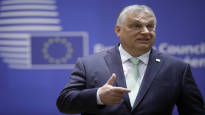Hungary has placed itself at odds with many EU decisions concerning Ukraine. The country’s actions have been seen as blackmailing the Union.
In ‘s morning, researchers highlighted a new way to limit Hungary’s soloing in EU decision-making.
Hungary has placed itself at odds with, among other things, starting Ukraine’s EU membership negotiations and helping Ukraine financially. Membership negotiations Hungary accepted, no aid. Hungary’s actions have been interpreted as blackmailing the EU.
Earlier this week, the European Commission released more than 10 billion euros in aid money intended for Hungary, which had been frozen until Hungary implements the rule of law reforms required by the EU.
Hungary is the prime minister Viktor Orbán during the period of power, among other things, weakened the position of the judiciary, free media and minorities.
– Hungary has not done anything special in this issue of the rule of law, apart from creating a huge number of laws, which are more like a smoke screen or a shop window or a goldmine. They have no real significance for the development of the rule of law, says the Aleksanteri Institute researcher Katalin Miklóssy.
The EU could exclude Hungary from decision-making
Hungary’s actions are difficult for the EU, as many of the Union’s decisions require unanimity.
However, Hungary’s power in the EU could be limited by using Article 7 of the Treaty on European Union. With it, sanctions can be imposed on Hungary, and the country could, for example, be excluded from EU decision-making.
– It would be a rather sudden, quick solution to the fact that Hungary cannot single-handedly tighten the EU’s foreign or budget policy, Miklóssy says.
Also program director of the Institute for Foreign Policy Juha Jokela considers the introduction of Article 7 possible. The European Parliament actually launched the Article 7 procedure already in 2018, but in practice it has not progressed.
– Previously, it was seen that Poland and Hungary are playing in the same bag, as it were. Since taking away the right to vote requires unanimity, it was interpreted that no progress could be made. Now the situation may have changed, says Jokela.
Poland has not followed Hungary’s bandwagon in EU decision-making, but, for example, accepted Ukraine’s membership negotiations and aid.
On the other hand, in Slovakia, for example, the pro-Russian Smer party came to power in October, and the far-right PVV won the November elections in the Netherlands. They are critical of the EU and helping Ukraine.
Miklóssy points out that next June’s European Parliament elections are of great importance. The new parliament may be very different from the current one, says Miklóssy.
– We already know that EU critics, national conservatives and even extremist forces will increase their share in the parliament. Next summer, we will have a completely new kind of parliament, which may not follow the ideal of the rule of law.
